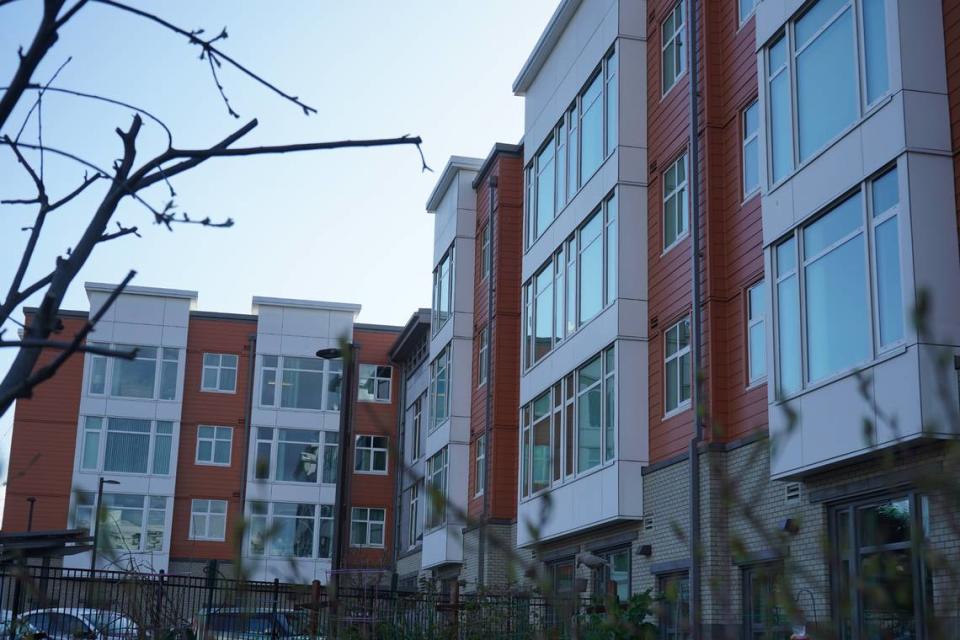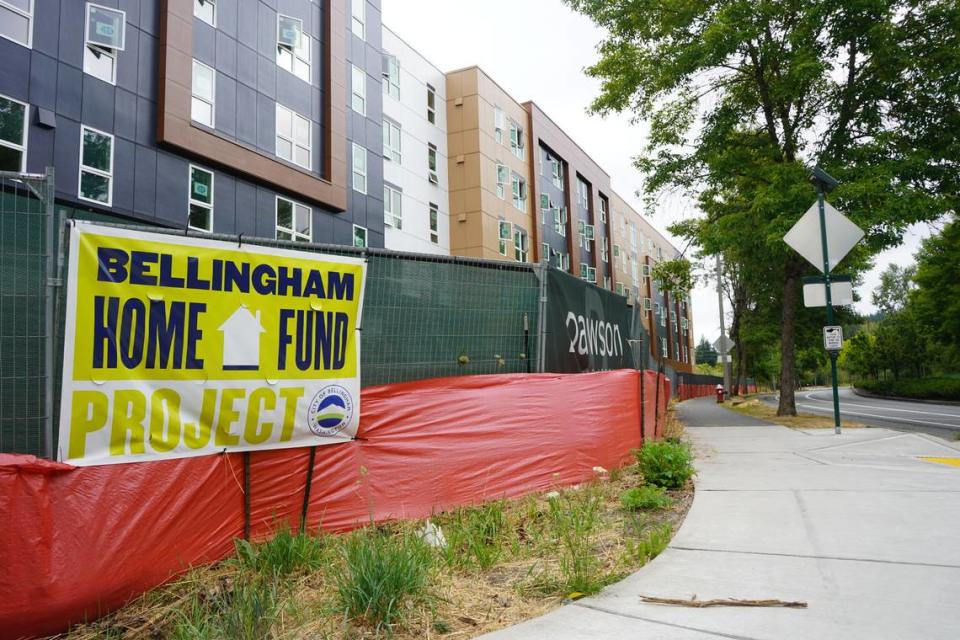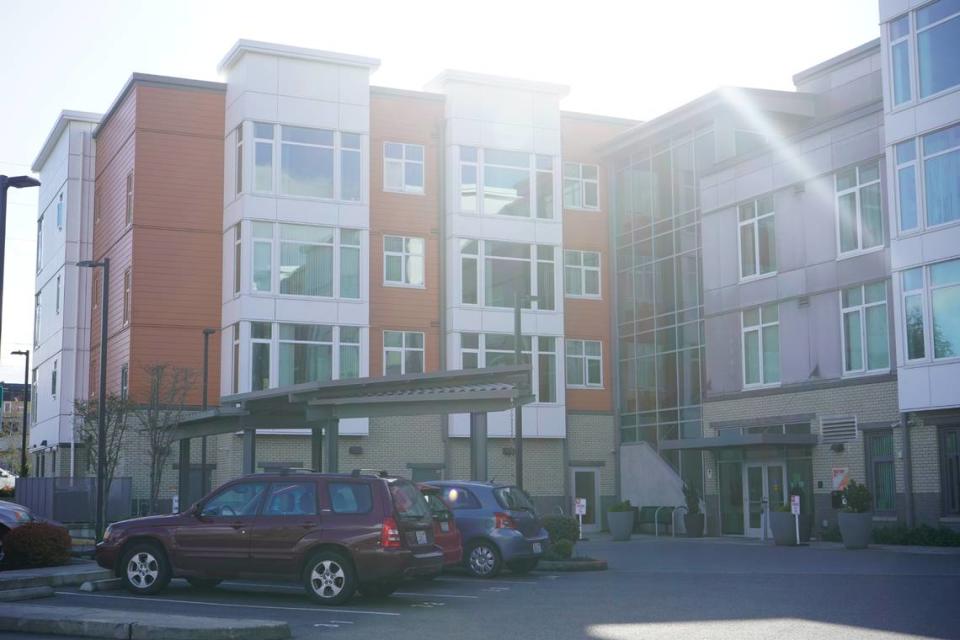‘It’s 86 degrees in here’: Affordable housing residents call for action amid Bellingham heat wave
Residents at the Trailview and Eleanor Apartments — two affordable housing complexes in Bellingham — are raising concerns about rising temperatures in their buildings and a lack of available resources to help them stay cool during July’s heat wave.
Neither housing complex — run by nonprofit developer Mercy Housing — is outfitted with central air conditioning inside the units, which is common among affordable housing developments in Washington State built before 2023.
Trailview resident Aurora Fox, 73, has lived in her unit since it opened a year and a half ago. She’s one of many older residents living in affordable housing who also deal with health issues that are exacerbated by extreme temperatures.
She told The Bellingham Herald her apartment has been reaching temperatures in the high 80s during the last week. On Tuesday, her unit reached 87 degrees even while running two fans inside.
“It’s hot. 85 is hot. Last summer my apartment got up to 89 once. I’m only comfortable if I’m sitting in front of the fan. If I get up to do anything I get really sweaty and hot,” Fox said.
A mother and her children in one Trailview unit have had trouble sleeping, Fox told The Herald. Fox’s next-door neighbor, another senior, has also been struggling to stay cool in her unit.
“There are elderly people here,” Fox said. “I just don’t want anybody to die.”
A history of heat-related safety concerns
This isn’t the first time some Mercy Housing residents have spoken out about heat-related concerns in their units.
Residents at the Eleanor Apartments began raising concerns about safety after a resident died in the building due to an apparent heat stroke during the record heat wave in the summer of 2021.

Residents say the multi-story housing development frequently gets too hot during the summer months and the upstairs hallways are often above 85 degrees. Due to code restrictions, residents were unable to open some of the windows in their rooms more than a few inches, making it difficult to manage the high temperatures.
Responding to concerns
The Eleanor and Trailview Apartments both have air-conditioned community rooms that are meant to be open during extreme weather events, but residents at Trailview say they have had no access to that space as the apartments have lacked full-time management for several months.
“I live at Trailview Apartments in Barkley run (by) Mercy Housing. We have been without management for months. We have a ‘community room’ that is air conditioned but is locked because we don’t have staff to supervise (the) room,” one resident wrote in a letter she says she sent to the state attorney general, the Department of Health and the Opportunity Council. “So this means we have to suffer during this heat wave. I’m open to suggestions as to who we can contact. Mercy Housing directly will not help.”
Residents told The Herald the community room at Trailview was much needed during several high-heat days last week. It wasn’t opened until Monday afternoon after several residents attempted to contact Mercy Housing, the national nonprofit developer that owns and operates both housing complexes.
“I’m glad to see they responded and opened the room,” Fox said. “But we’re a bit frustrated. Our community room should be a community room where we can go in and use it.”
Mercy Housing did not respond to a request for comment before publication. But the nonprofit has previously told The Herald it wants to make an effort to help residents.

Last summer, the affordable housing provider made efforts to provide dozens of portable air conditioning units to residents at the Eleanor for free via their reasonable accommodation request process. Still, residents say it’s not enough.
“Even with a portable air conditioner on the fourth floor at Eleanor, my corner apt is low 80s by early evening,” Eleanor resident Karina Davidson told The Herald. “It’s really disappointing. Relief is needed.”
The city of Bellingham also works to provide fans to vulnerable or isolated people by partnering with health and social service providers to identify those in need, “particularly older adults who are home bound or have other risk factors,” Mayor Kim Lund said in a statement to The Herald.
“We are putting staff resources into collaboration with Whatcom County and emergency management partners to jointly identify space and other resources needed to operate cooling centers. We are asking other partners to support this work and how they might be able to play a role in these efforts,” Lund told The Herald.
The city monitors several factors to determine whether a heat emergency response is needed, including:
▪ Proactively monitoring 911 call volumes for increased reports of heat-related illnesses or impacts.
▪ Tracking temperatures that do not decrease after sunset.
▪ Looking at overall air quality impacts.
Statewide solutions
New building requirements across the state are also changing as climate concerns remain at the forefront of many policy discussions.
As of July 1, 2023, Washington state adopted a code change requiring electric heat pumps to be installed in new homes, multifamily buildings and commercial spaces. Electric heat pumps move cold air inside when it’s hot and move warm air inside when it’s cold, according to the Department of Energy.
That code was amended after a lawsuit challenged it, saying it would put an undue cost burden on homeowners and developers. Now state building code highly incentivizes electric heat pumps by requiring new buildings to meet the same efficiency as those that include them, but does not require heat pumps to be installed.

The code did not include those requirements when the Eleanor was built in 2017 or when Trailview was completed in late 2022. But the newest local affordable development built by Mercy Housing, The Millworks Project at Bellingham’s waterfront, does have in-unit air to help prevent residents from dealing with high temperatures during heat events like this one.
Extreme heat impacts
During the record heat wave between June 26 and July 2, 2021, the Pacific Northwest saw more than 100 heat-related deaths, according to the Washington State Department of Health.
The average number of heat-related illness emergency department visits between June 25 and June 30, 2021, was 69 times higher than during the same period of days in 2019, according to a report by the Centers for Disease Control and Prevention that included Alaska, Idaho, Oregon and Washington.
The most affected groups were males and people age 75 and older. Vulnerable populations, including low-income seniors like the residents at the Eleanor, are the most impacted by these types of extreme weather events, which are only expected to become more frequent and worsen over time.
Editor’s note (11:15 a.m. July 11): An earlier version of this story improperly described the Washington State Building Code requiring electric heat pumps to be installed in all new buildings. Those code changes were initially approved but were later amended after a lawsuit sought to block that requirement. The state code instead now highly incentivizes electric heat pumps by requiring new buildings to meet the same efficiency as those that include them, but does not require heat pumps to be installed.

